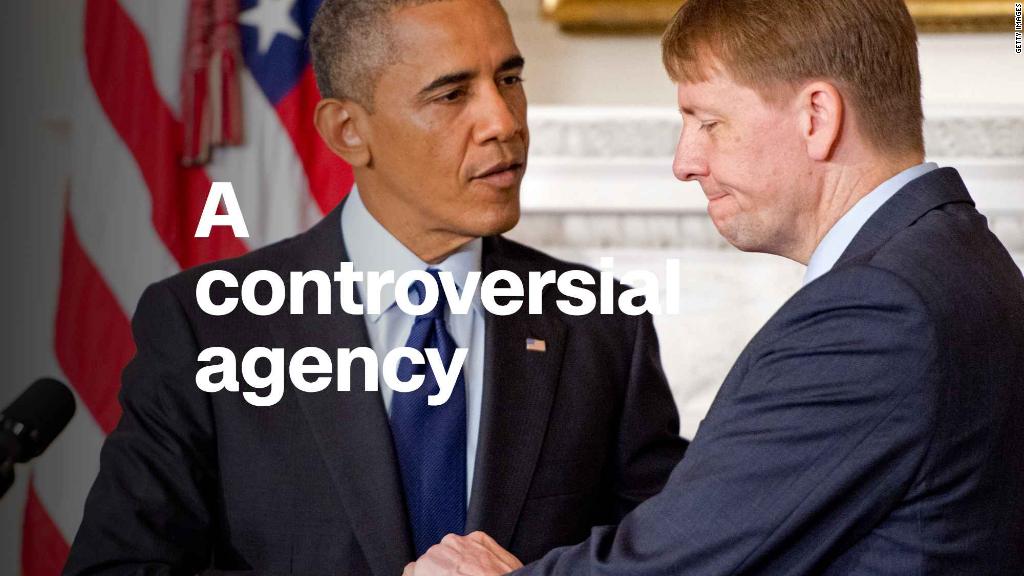
Mick Mulvaney argues the Consumer Financial Protection Bureau is "trampling on capitalism" -- a problem he has promised to fix immediately.
During his first day as the watchdog agency's acting director on Monday, Mulvaney announced a 30-day freeze on new regulations so he can make sure they are not "choking off" lending. Mulvaney said he will soon be briefed on the roughly 100 lawsuits the agency is involved with.
"Anything that is discretionary we're putting a 30-day hold on," Mulvaney told reporters.
Mulvaney has long been a sharp critic of the CFPB. Now his distaste for the bureau is raising questions about what will happen to the many open investigations and lawsuits it has launched against companies and banks.
Court documents and regulatory filings show these targets include Wells Fargo (WFC), online real estate database Zillow (Z) and student loan processor Heartland Campus Solutions. The CFPB is also likely looking into other companies that have not yet disclosed the investigations.
"Rumors that I am going to set the place on fire, blow it up or lock the doors are completely false," Mulvaney said.
However, Mulvaney, who as a lawmaker voted to abolish the CFPB altogether, said President Trump wants him to "fix" the CFPB because the previous administration "went too far."
Trump signaled on Twitter a desire to rein in the CFPB, calling the agency a "disaster" that has "devastated" banks and made it impossible for them to "properly serve the public." It's part of Trump's effort to slash regulations broadly.
"It's very clear that the financial sector is the primary winner from a weakened CFPB and that consumers are the losers," said Patricia McCoy, a Boston College law professor and a former CFPB official.
It wasn't entirely clear Monday who was in charge of the CFPB. Mulvaney said he's calling the shots. But he's also facing a lawsuit from Leandra English, who was named interim director on Friday by the outgoing director.
But in the end Trump will get to name a permanent director. Under Mulvaney or another Trump-appointed official, CFPB's "enforcement agenda will dramatically diminish," Isaac Boltansky, senior policy at Compass Point Research and Trading, wrote in a report on Monday.
Quyen Truong, former deputy general counsel at CFPB, expects the bureau will "not pursue the type of aggressive claims it has to date."
Wells Fargo
The CFPB made a name for itself by taking on Wells Fargo last year. The agency, along with the Office of Comptroller of the Currency and the Los Angeles city attorney, fined Wells Fargo $185 million for opening millions of fake bank and credit card accounts.
Mulvaney, who questioned why the CFPB didn't find the Wells Fargo fiasco earlier, reiterated on Monday that he is "disturbed" by the scandal at the bank.
Earlier this month, Wells Fargo said the CFPB had launched an investigation into its mortgage business. Wells Fargo has admitted that some borrowers were wrongly charged fees for missing a deadline to lock in promised interest rates -- even when the delays were the bank's fault.
Separately, Wells Fargo (WFC) said the CFPB is investigating whether customers were harmed by the bank's freezing and closing deposit accounts after Wells Fargo detected suspected fraudulent activity.
The CFPB could also look into Wells Fargo's auto lending problems. Wells Fargo has said it charged as many as 570,000 customers since 2012 for car insurance they didn't need.
Wells Fargo declined to comment on the CFPB leadership changes.
Related: Why Wall Street and Republicans hate the CFPB
Zillow
The CFPB launched an investigation in 2015 into Zillow's (ZG) advertising practices. The regulator is looking into a "co-marketing" program at Zillow that allows lenders and real estate agents to share the cost of advertising on the site.
Zillow has said the CFPB is probing potential violations of the Real Estate Settlement Procedures Act, which bans kickbacks in exchange for business referrals.
Zillow is in talks with the CFPB over a possible settlement even though it believes its practices are "lawful," company executives said during a recent conference call.
Heartland Campus Solutions
On November 16, the CFPB sued Heartland Campus Solutions, saying the company failed to comply with a CFPB investigation. The CFPB said in court documents that it's investigating whether Heartland engaged in unlawful practices connected to the servicing of student loans.
Global Payments (GPN), which owns Heartland, did not respond to a request for comment.
Freedom Debt Relief
On November 8, the CFPB sued Freedom Debt Relief, the largest U.S. debt settlement services provider, and its co-CEO Andrew Housser. The CFPB alleged that Freedom Debt Relief charged consumers without settling their debts and imposed misleading fees.
Freedom Debt Relief said in a statement that its practices are "legally compliant, highly ethical and serve the needs of our customers." The company said it will "vigorously contest" the lawsuit.
Think Finance
The CFPB alleges that Think Finance, a financial technology company, tricked customers into paying debts they did not legally owe. The CFPB filed a lawsuit on November 15 alleging Think Finance "made deceptive demands and illegally took money from consumers' bank accounts."
Think Finance did not respond to a request for comment.
--CNNMoney's Allie Malloy and Nathaniel Meyersohn contributed to this report.


